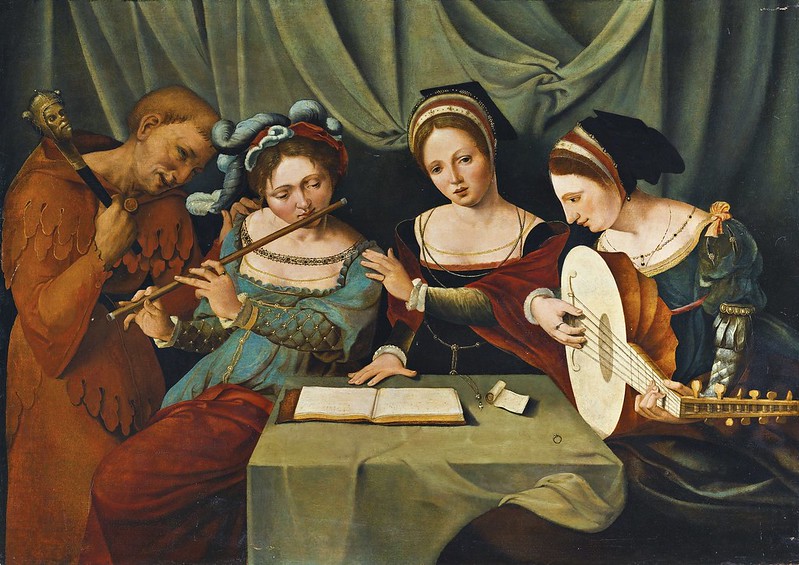Michael Praetorius (1571-1621)
- Magnificat (1611)
Performers: Huelgas Ensemble
Painting: Master of the Female Half-lengths (16th Century) - Three Young Women Making Music with a Jester
Further info: Michael Praetorius (1571-1621)
---
German composer, theorist and organist. Wetzel and Walther both stated
that Praetorius was born on 15 February 1571 and died on his 50th
birthday, but this could be a mistake, since according to a poem
appended to his funeral sermon he was only in his 49th year when he
died. But 1571 is the most commonly accepted year of his birth. His
father, who was also called Michael and came from Bunzlau, Silesia, was
from 1534 at the latest a colleague of Johann Walter at the Lateinschule
at Torgau. His son Michael was born during a second period of service
at Creuzburg that began in 1569, but in 1573 the family moved to Torgau.
At the Lateinschule there Praetorius was taught music by Michael Voigt,
Walter’s successor as Kantor. In 1582 he matriculated at the University
of Frankfurt an der Oder, where his brother Andreas was professor of
theology. In 1584 he attended the Lateinschule at Zerbst, the home of
two of his sisters, and from there he returned to Frankfurt an der Oder.
Although he probably had no musical education after leaving school, it
is certain that he became acquainted with Bartholomäus Gesius at
Frankfurt, with whom he shared a strong interest in Protestant hymns and
their melodies as well as in alternatim practice. After the early death
of his brother, he was appointed organist of St Marien, Frankfurt,
probably at the beginning of 1587. By his own account he held this post
for three years, but it is not known why he gave it up or where he went
in 1590. According to a later report Praetorius settled at Wolfenbüttel
in about 1592-3, but to judge from his own testimony in his Motectae et
psalmi (1607) and Polyhymnia caduceatrix (1619) it was not until 1595
that he entered the service, as an organist, of Duke Heinrich Julius of
Brunswick-Wolfenbüttel, who had his residence there. In 1596 he took
part with the most famous German organists of the day in the
consecration of the organ in the castle chapel at Gröningen, near
Halberstadt. In 1602 he stayed at Regensburg ‘on his own business’ and
as a member of the Wolfenbüttel delegation to the Reichstag.
In February 1603 he was again in Regensburg on ducal business and is
recorded as an organist. In September 1603 he married Anna Lakemacher,
who bore him two sons. Praetorius had won such esteem by 1604 that,
while retaining the post of organist, he was appointed court
Kapellmeister on the retirement of Thomas Mancinus. There is evidence
that in 1605 and 1609 he stayed at the court of the music-loving
Landgrave Moritz of Hesse at Kassel. This was an extremely busy period
for him: most of his collections of music appeared between 1605 and
1613. The sudden death of Duke Heinrich Julius in Prague in 1613 was a
turning-point in Praetorius’s life. The Elector Johann Georg of Saxony
immediately asked the duke’s successor, Friedrich Ulrich, to let
Praetorius spend his year of mourning as deputy for the aging Rogier
Michael, Kapellmeister of the electoral court. The year eventually
became two and a half years, which Praetorius spent mostly at Dresden.
He not only had responsibility for the music at the Assembly of Electors
at Naumburg in 1614 and met Schütz in Dresden but also, more
importantly, got to know the latest Italian music, which influenced his
later work in significant ways; he must also have devoted more and more
time to his theoretical work. His period in Dresden officially ended in
1616, but he was there again in 1617 to organize the ceremonial music
for the emperor’s visit and for the centenary celebration of the
Reformation. From 1614 he was also Kapellmeister to the administrator of
the bishopric of Magdeburg. At Easter 1616 he was working at Halle, and
in 1617 he built up the Hofkapelle of the counts of Schwarzburg at
Sondershausen and also stayed once more with Landgrave Moritz of Hesse
at Kassel, this time for a baptismal celebration, for which he wrote a
Concertgesang. In 1618 he was summoned, along with Schütz and Scheidt,
to Magdeburg Cathedral to mark the reorganization of the music there,
and he is known to have visited Leipzig, Nuremberg and Bayreuth (again
with Schütz and Scheidt) in 1619. After his death, he left an impressive
fortune, most of which was to be used to set up a foundation for the
poor. As the son and grandson of theologians he was a firm Christian all
his life.

Cap comentari:
Publica un comentari a l'entrada